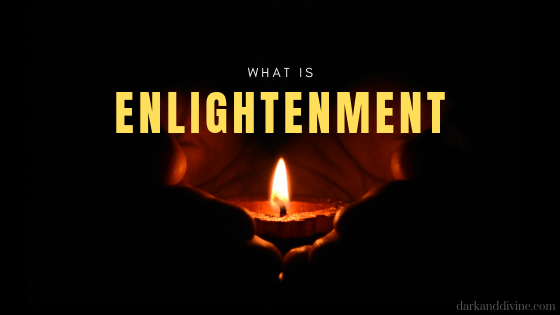“Enlightenment” is usually used in two different senses. One is an intellectual movement that began in 17th century Europe that emphasized reason and the scientific method. The other use of the word “enlightenment” is a spiritual state, which is the version we’ll be exploring here.
For many spiritual seekers enlightenment is the goal, yet the goal is vaguely defined. There seems to exist within us an archetypical idea of a perfected sage, a master of wisdom. So when we hear that there are such people or that we could eventually become one, there can be a feeling that resonates that this is true. Perhaps because of an instinctual feeling that enlightenment exists, some of us may not question it or think about it too deeply.
Spiritual enlightenment tends to be viewed as a long term goal, taking decades within one life or even requiring many, many lives through reincarnation. For people who believe in enlightenment enough to do many years of work, they ought to know what the goal of their journey is.
I do not believe myself to be enlightened. I’m not even certain it exists. But I’ve been paying attention to the use of this word, its connotations, and the different versions of what is meant by it. In all versions of spiritual enlightenment, it seems to be described as a desirable state which once you reach it, you remain with that state and cannot lose it.
One version of enlightenment is to reach a fixed state of unconditional love for all things, all the time. It may be framed by saying one sees God in all things. This version of enlightenment seems to be primarily emotional. Feeling blissful may reduce mental thoughts and give the body a kind of charming glow.
Another version of enlightenment seems to be primarily based on the intellect. It is a state in which all things are known, where there are no mysteries remaining. Often this seems to be portrayed by having a 3rd eye, 6th sense or some kind of intellectual faculty that is far superior to the ordinary mind. In stories and art, it is usually shown as being acquired through a singular moment of enlightenment, where the spiritual seeker has a massive explosion of insight, as though all knowledge of the universe were downloaded in an instant. The enlightened being then seems to have transcended earthly life, but while on earth can effortlessly act according to great wisdom. By learning the true nature of reality, they become detached to what the rest of us consider to be real. It is as though they have awoken from a dream.
The third version of the meaning of enlightenment is to have full consciousness. It is more physically based than the other two. In this state of full consciousness, there is constant, extreme presence in the moment. No aspect of the enlightened being happens unconsciously and automatically. Everything is witnessed. The inner and outer experience is always perceived with full alertness. In some Buddhist monistaries, the master would try to sneak up on the student and hit them, because it would train the student to be more conscious of the present moment and surroundings. Meditation seems to be an important practice for those seeking this version of enlightenment. People who have been said to master this version of enlightenment are sometimes attributed with having great power over other people, since everyone else is so unconscious in comparison, but are benevolent.
The word “enlightenment” can also be used to reference some combination of these three versions above. If they all exist, it seems reasonable that any one version could exist independent of the other two. And if that is the case, are there different kinds of enlightened masters?
Some people say “you are already enlightened”. If everyone is already enlightened, then enlightenment is not viewed as a goal and there isn’t a hierarchy where some people are more, or fully, enlightened and others aren’t. What they might mean is that our “true self”, or soul, is already enlightened, but we are veiled from this experience of our true self. But even if that were true, we are not experiencing enlightenment. This term seems a little dangerous because depending on the context, it may be a comfortable way of removing the responsibility of having to make a spiritual effort and be somewhat narcissistic. But it may provide some balancing to people who think too little of themselves and believe that enlightenment is possible for others, but it is not possible for them. People who think too great of themselves would probably do better not thinking of themselves as enlightened.
Then there is the idea that there is no such thing as spiritual enlightenment. This comes from reasonable thinking and nothing experiential to validate it either. Personally, I like skepticism so long as there is openness and the ability to look not just at the facts of things, but the value of it and to be able to take the worthwhile parts of things while ignoring the rest. If enlightenment doesn’t seem like a real possibility through reason or experience, fair enough.
For those that do believe in enlightenment, perhaps it might be good to get more grounding in what we are really talking about. You’ll get more out of a school if you know why you are there and what it leads to.

